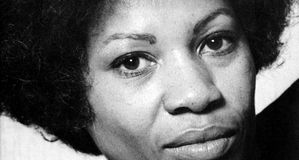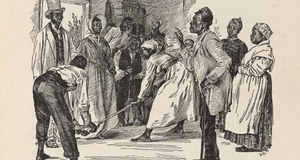Naming and Identity in Toni Morrison's Beloved and Song of Solomon
By
2014, Vol. 6 No. 06 | pg. 3/3 | « Macon’s total rejection of the past contrasts sharply against Ruth’s nostalgia for it. The name “Dead” fits her well because, according to Page (1995), “She perpetuates the ghost of her father and the ghost of time past, as symbolized by the water mark on her table” (86). She remains eerily close to her father and is “her daddy’s girl” even after his death, sometimes visiting his grave and sleeping there. Like Quentin from The Sound and the Fury or Amanda Wingfield from The Glass Menagerie, Ruth Foster lusts after a past that no longer exists. One of the few things that makes her life bearable is breast feeding Milkman, an activity that she should have let go of years before she did—and that choice was not her own. Ruth’s inability to let go of a loved one is mirrored by Hagar’s self-mutilating love for Milkman, “the man for whom she believed she had been born into the world” (Morrison, 1977, p. 127). She wants to be his home, just as Ruth does. Both women value themselves only as much as the man they love does. He is Ruth’s “single triumph” (Morrison, 1977, p. 133). He is the object of Hagar’s suffocating graveyard love. Yet, for as deeply as they care about Milkman, their respective kinds of love are also dead. Ruth categorizes Hagar as not a person but “an impulse, a cell, a red corpuscle that neither knows nor understands why it is driven to spend its whole life in one pursuit…” (Morrison, 1977, p. 137). Hagar can never articulate why she loves Milkman so much. She just does. The mother also realizes that Milkman possesses “feelings on the inside that she knew nothing of” (Morrison, 1977, p. 133). They believe that whoever has the stronger love will come to possess Milkman. However, as Guitar puts it, “It’s a bad word, ‘belong.’ Especially when you put it with somebody you love. Did you ever see the way the clouds love a mountain? They let him keep his head up high, free” (Morrison, 1977, p. 306). The two women are unknowingly embracing the “Dead” identity, the one that tries to keep its past buried. Ruth and Hagar’s true identities are unknown, so they make futile efforts to create an identity through Milkman. Hagar’s name is also indicative of how Milkman views her. In the Bible, Hagar is a concubine to Abraham. In Song of Solomon, Hagar is only valued for her sex. Even that eventually is not enough to keep Milkman attached to her.One of the major developments within the bildungsroman that is Milkman’s quest to uncover his identity comes just after his car breaks down and he has a knife pulled on him. Milkman realizes that “here, in his ‘home,’ he was unknown, unloved, and damn near killed” (Morrison, 1977, p. 270). In other words, he can finally identify with other African Americans. The destruction of the white Negro has begun. Milkman’s car is dead. This symbolizes not only a break in his lifelong habit of using things he has been gifted, but also an acceptance of community. Traveling in a car is a private experience. After the car breaks down, Milkman must travel on the bus, just like other black people. He has been transformed from a solitary black man into one who is a part of every community he has ever seen: “He closed his eyes and thought of the black men in Shalimar, Roanoke, Petersburg…in the pool halls, the barbershops. Their names. Names they got from yearnings, gestures, flaws, events, mistakes, weaknesses. Names that bore witness” (Morrison, 1977, p. 330). He takes interest not just in his own history but others as well: “He read the road signs with interest now, wondering what lay beneath the names” (Morrison, 1977, p. 329). He returns home with a true knowledge of himself, an understanding that the world is much bigger than himself, his father, and Not Doctor Street. This inner contentment replaces all of the material objects he had started out with on the beginning of the journey: “His suitcase with the Scotch, the shirt, and the space for the bags of gold; his snap brim hat, his tie, his shirt, his three piece suit, his socks, and his shoes” (Morrison, 1977, p. 277). The fact that a woman named Sweet helps Milkman learn about his ancestors—Solomon, Ryna, Black Jake, and Sing, among others—combined with the description of how “he was excited as a child confronted with boxes and boxes of presents under the skirt of a Christmas tree” speaks to how reconciling with the past is a wonderful thing, a thing that he should own (Morrison, 1977, p. 304). One of the other characters who causes Milkman to eventually dive (or perhaps fly would be a more appropriate verb) headlong into his past is his aunt, Pilate. The Dead family had a tradition of naming every child, with the exclusion of the first born son, after a Biblical character. So, Macon’s father “had thumbed through the Bible, and since he could not read a word, chose a group of letters…that looked like a tree hanging in some princely but protective way over a row of smaller trees” (Morrison, 1977, p. 18). Although the midwife is horrified at the name selection, it fits Pilate well. She does protect a pair of small people (Ruth and the then unborn Milkman) from Macon’s abortion attempts. Even more importantly, the name “Pontius” is derived from the Latin pons, which translates to “bridge.” When Milkman was born, Pilate was singing to him. According to the book Circles of Sorrow, Lines of Struggle: The Novels of Toni Morrison, that song “hearkens back to the blues tradition that Pilate has kept. A song is what Pilate offers her nephew, a song that is a register of historical and cultural memory, which revises for Milkman the very field of his middle class identifications” (Grewal, 1998, p. 61). Pilate also demonstrates other tendencies that Milkman can learn from and use to travel away from the Dead name. For instance, whenever Milkman is talking to Pilate, she is at her home; Hagar and Reba are usually present. This implies that, for Pilate, family is very important. Milkman, on the other hand, is separate from his family even when he spends time with them. He cannot “distinguish them [his sisters] from his mother” (Morrison, 1977, p. 68). This is mainly because his sisters spent the majority of their lives caring for him. Pilate, meanwhile, cares about and watches over her family like a hawk. When Reba’s “man friend” starts a quarrel, Pilate coolly terminates it by nearly stabbing a knife into his heart. She says that she’d regret pulling the knife out and have the man come back to disrespect Reba again. On the other hand, she’d hate stabbing the knife in further and having that man’s mother feel so much agony over her son’s death. In this situation, an unknown mother is important to Pilate. The verb “kept” (used in the earlier quotation from Grewal’s book) is also appropriate, because that is what Pilate has done with her own name. One day, she opened the family Bible, found a page with “Pilate” on it, tore it out, and crafted it into an earring. Similarly, she “had taken a rock from every state she had lived in—because she had lived there” (Morrison, 1977, p. 329). In that instance, Milkman realizes that Pilate’s small possessions are worth more than those of his landlord father. Pilate owns land because, having been there, it naturally becomes hers. Macon owns land not because he has a true claim to it, but because he simply wants something to own. One of the more intricate details of Morrison’s naming ability is how she uses more than just her own African heritage to identify her characters. There is often a blend of cultures at work in her novels. For instance, Beaulieu (2003) explained, “Beloved was murdered, and this violent end causes her soul unrest in Western tradition. However, she was named and received her gravestone in an act of sexual submission…and this has made her angry in the African myth…” (p. 15). Additionally, Sethe naming her baby “Dearly Beloved” because of the preacher makes a confused identity for Beloved. This unclear naming means that “Beloved…becomes a trickster able to change forms and cause trouble and misfortune among the living” (Beaulieu, 2003, p. 15). Beloved changes her form in multiple ways. She transforms from a ghost into a physical being, obviously. However, she also evokes changes in others. As Beloved grows and Sethe withers under the weight of their parasitic love, Denver must “step off the edge of the world, leave the two behind and go ask somebody for help” (286). She goes out into the community, first being gifted food by strangers. They leave their names on plates, bowls, and casserole dishes, so she becomes better acquainted with the community around 124. Eventually, she finds work, transforming from a passive receiver of kind deeds into someone who can control her own destiny. In return, she and Sethe are once again beloved members of the community. This communal love, this “hill of black people” accepts Denver and Sethe as they run away from Beloved (Morrison, 1987, p. 309). One of the most interesting aspects of Denver’s transformation is that she became different from Beloved. Early in the novel, we see that Denver does not like sharing Sethe with anyone. When Paul D. comes, it annoys Denver. She shared in her family’s “thick love.” This separation is especially interesting in light of the information found in “Bridges to Understanding in Toni Morrison’s Beloved.” According to Coonradt (2005), “The name [Amy Denver, Denver’s namesake] from the Old French “Aimee”…derives from the Latin amatus (loved) and literally means ‘beloved’” (170). Denver successfully extricates herself from Beloved’s identity by accepting what occurred in the past and embracing her black community. Beloved is stuck in the past, forever nursing grievances against Sethe, and so is banished from the present. This final paragraph highlights the most important lesson Morrison teaches by emphasizing naming so much within her writing: we can only progress in life when we come to terms and accept all of who we are. ReferencesBeaulieu, E.A. (2003). The Toni Morrison encyclopedia. Westport: Greenwood Publishing Group, Inc. Boudreau, K. (1995). Pain and the unmaking of self in Toni Morrison’s Beloved.” Contemporary Literature. Retrieved from http://0-www.jstor.org.library.jcu.edu/stable/1208829 Coetzee, J.M. (1980/2012). Waiting for the barbarians. The Norton Anthology of English Literature, Vol. F, 2984-2996. Coonradt, N.M. (2005). To be loved: Amy Denver and human need: bridges to understanding in Toni Morrison’s Beloved. College Literature. Retrieved from http://0- www.jstor.org.library.jcu.edu/stable/25115312 Darling, M.J. (1988). In the realm of responsibility: A conversation with Toni Morrison. Retrieved from http://0-www.jstor.org.library.jcu.edu/stable/4020269 Grewal, G. (1998). Circles of sorrow, lines of struggle: The novels of Toni Morrison. Louisiana: Louisiana State University Press. Morrison, T. (1977). Song of solomon. New York: Random House. Morrison, T. (1987). Beloved. New York: Random House. Jesser, N. (1999). Violence, home, and community in Toni Morrison’s Beloved. African American Review. Retrieved from http://0-www.jstor.org.library.jcu.edu/stable/2901282 Jimenez, J. (2002). The history of grandmothers in the african american community. Social Service Review. Retrieved from http://0- www.jstor.org.library.jcu.edu/stable/10.1086/342994 Neal, A. (2001). The naming: A conceptualization of an african american connotative struggle. Retrieved from http://0-www.jstor.org.library.jcu.edu/stable/2668014 Page, P. (1995). Dangerous freedom: Fusion and fragmentation in Toni Morrison’s novels. Mississippi: University Press of Mississippi. Schappell, E. (1993). Toni Morrison: The art of fiction no. 134. The Paris Review. 16-23. Suggested Reading from Inquiries Journal
Inquiries Journal provides undergraduate and graduate students around the world a platform for the wide dissemination of academic work over a range of core disciplines. Representing the work of students from hundreds of institutions around the globe, Inquiries Journal's large database of academic articles is completely free. Learn more | Blog | Submit Latest in Literature |
















